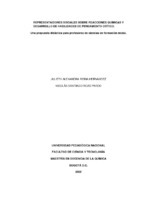Representaciones sociales sobre reacciones químicas y desarrollo de habilidades de pensamiento crítico. Una propuesta didáctica para profesores de ciencias en formación inicial.
Citación
Fecha
2022Autor
Reina Hernández, Julieth Alexandra
Rozo Pardo, Nicolás Santiago
Director / Asesor / Tutor
Pérez Miranda, Royman
Palabras claves
Habilidades de pensamiento crítico
Representaciones sociales
Reacciones químicas
Profesores de ciencias en formación inicial
Keyword
Critical thinking skillsSocial representations
Chemical reactions
Science teachers in initial training
Metadatos
Mostrar el registro completo del ítemResumen
En esta investigación se abordan las habilidades de pensamiento crítico (HPC) en los profesores de ciencias en formación inicial (PCFI) desde estrategia didáctica centrada en las representaciones sociales (RS) de las reacciones químicas y su relación con los conceptos químicos, sus implicaciones sociales y ambientales para analizar las distintas controversias que se generan a partir de esta situación. Las HPC son relevantes en la formación profesional de los PCFI, éstas le permiten al docente conocer e interactuar con contextos y ambientes teórico-prácticos de la enseñanza, ellas promueven una enseñanza que cubra las diferentes perspectivas, necesidades y campos de acción. Reconocer las representaciones sociales de la química, entendidas como la relación entre el individuo ya sea estudiante o profesor y la temática que se está abordando, el cómo este escribe, representa o sustenta un concepto o un tema relacionado con el campo en específico. Al articular estas dos perspectivas se genera un campo de investigación interrelacionado, en el que se indaga por dichas habilidades y su desarrollo en el profesor de ciencias en formación inicial cuando se trabaja reacciones químicas a partir de sus representaciones sociales al respecto. Teniendo en cuenta esto, se realizó el trabajo investigativo sobre el desarrollo de las habilidades pensamiento crítico en torno a la argumentación, el análisis y la resolución de problemas en cuanto a las representaciones sociales de los profesores de ciencias en formación inicial frente a las reacciones químicas, el desarrollo de una práctica de laboratorio, teniendo en cuenta su fase previa, su proceso y finalización en cuanto a las reacciones químicas, en este caso el impacto ambiental de las mismas relacionadas con la química verde y las energías alternativas.
Abstract
This research addresses critical thinking skills (HPC) in science teachers in initial training (PCFI) from a didactic strategy focused on social representations (SR) of chemical reactions and their relationship with chemical concepts, their social implications and environmental to analyze the different controversies that are generated from this situation. The HPC are relevant in the professional training of the PCFI, they allow the teacher to know and interact with contexts and theoretical-practical teaching environments, they promote a teaching that covers the different perspectives, needs and fields of action. Recognize the social representations of chemistry, understood as the relationship between the individual, whether student or teacher, and the topic being addressed, how he writes, represents, or supports a concept or topic related to the specific field. By articulating these two perspectives, an interrelated field of research is generated, in which these skills are investigated and their development in the science teacher in initial training when working on chemical reactions from their social representations in this regard. Taking this into account, the investigative work was carried out on the development of critical thinking skills around argumentation, analysis and problem solving regarding the social representations of science teachers in initial training against chemical reactions. , the development of a laboratory practice, taking into account its previous phase, its process and completion in terms of chemical reactions, in this case the environmental impact of the same related to green chemistry and alternative energies.
Editorial
Universidad Pedagógica Nacional
Programa académico
Maestría en Docencia de la Química

